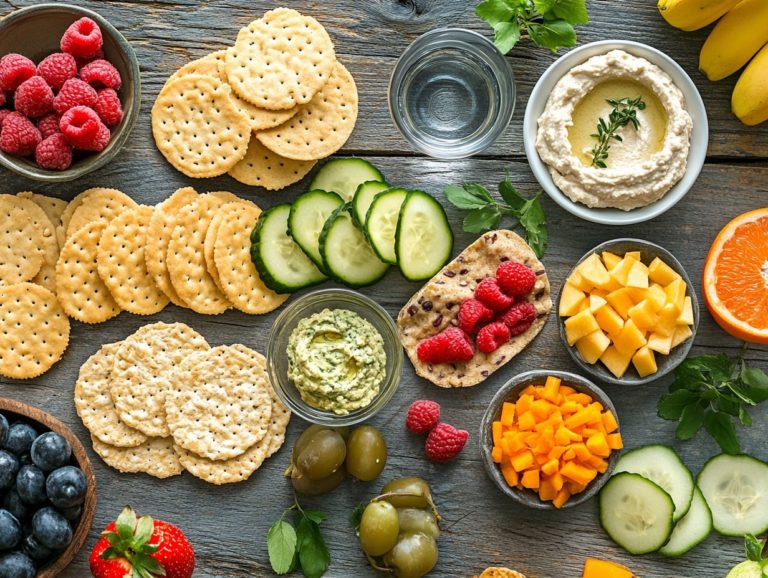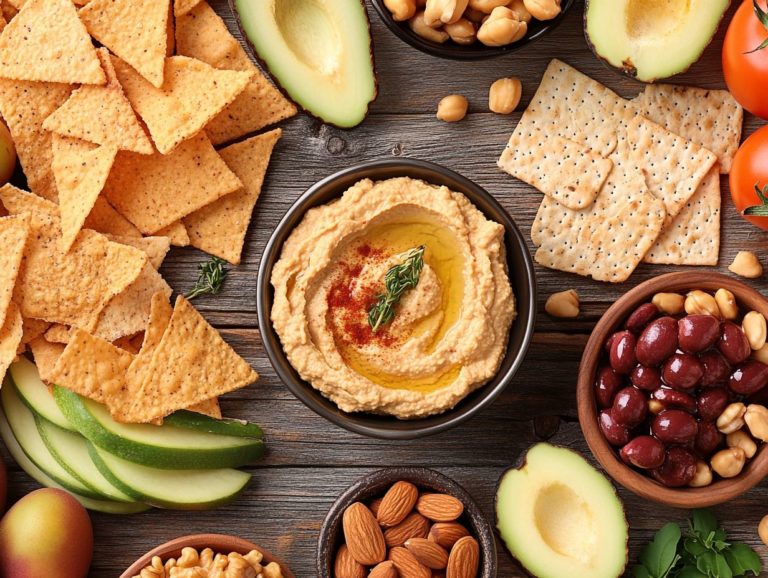Do I Need to Go Gluten-Free?
Gluten is a protein present in many staple foods, yet for some individuals, it can lead to significant health concerns including celiac disease, gluten sensitivity, and wheat allergy.
This article delves into the nature of gluten, providing a clear definition and pinpointing the foods that contain it. You ll discover insights into celiac disease, gluten sensitivity, and other medical conditions, along with thoughtful guidance to help you determine if a gluten-free lifestyle is suitable for you. Resources from the Mayo Clinic and Beyond Celiac are also discussed.
The discussion will also cover the potential benefits and risks associated with this diet, empowering you to make informed choices about your health and well-being.
Contents
- Key Takeaways:
- What Is Gluten?
- What Foods Contain Gluten? (According to the Food and Drug Administration)
- Do I Need to Go Gluten-Free? (Consulting Healthcare Providers)
- Who Should Go Gluten-Free? (Consult the Mayo Clinic)
- Who Should Not Go Gluten-Free? (A Balanced Perspective)
- What Are the Benefits of Going Gluten-Free? (Exploring Health Benefits)
- Understanding the Risks of a Gluten-Free Diet
- How to Determine If You Need to Go Gluten-Free?
- Frequently Asked Questions
- Do I Need to Go Gluten-Free?
- What is gluten and why do people avoid it?
- Can going gluten-free benefit my health even if I don’t have celiac disease?
- What foods should I avoid if I go gluten-free?
- Is it difficult to maintain a gluten-free diet?
- Do I need to go completely gluten-free or can I have small amounts?
Key Takeaways:

- Not everyone needs to go gluten-free, but those with celiac disease or gluten sensitivity should avoid gluten-containing foods.
- Benefits of a gluten-free diet may include improved digestion, increased energy, and weight loss, but there are also potential risks such as nutritional deficiencies, higher grocery costs, and cross-contamination risks.
- To determine if you need to go gluten-free, consult a doctor, keep a food journal, and consider trying an elimination diet to see if your symptoms of gluten intolerance improve.
What Is Gluten?
Gluten is a collection of proteins present in wheat and related grains like barley, rye, and triticale. It significantly contributes to the structure and texture of many processed foods you encounter daily.
However, this seemingly innocuous ingredient can pose health risks for individuals with certain medical conditions, such as celiac disease and gluten sensitivity. Grasping the nuances of gluten is crucial, particularly as it impacts a substantial segment of the population, including those with gluten intolerance and grain allergies.
What Foods Contain Gluten? (According to the Food and Drug Administration)
Foods containing gluten generally encompass processed items derived from wheat, barley, and rye, which can present significant risks for those with celiac disease, gluten sensitivity, or gluten ataxia. Knowing which grains to avoid is essential for your health!
It s essential for you to understand which grains are off-limits in a gluten-free diet to maintain optimal health and prevent cross-contamination. Becoming well-acquainted with food labels and gluten-free foods is crucial as you navigate these dietary restrictions, ensuring that you make informed choices for your well-being.
What Is Celiac Disease? (Supported by the National Institutes of Health)
Celiac disease is a condition where the body s immune system mistakenly attacks its own cells in response to gluten, wreaking havoc on your small intestine and leading to a range of gastrointestinal and systemic symptoms. It s quite common, affecting approximately 1 in 100 people across the globe, according to the Celiac Disease Foundation.
When you ingest gluten, your immune system responds by damaging the lining of your small intestine. This damage results in nutrient malabsorption and a host of potential health complications. If you have celiac disease, you might encounter symptoms like chronic diarrhea, abdominal pain, bloating, and fatigue.
The variability in these symptoms can often complicate the diagnostic process. To confirm the condition, blood tests that measure specific antibodies are typically performed, followed by a biopsy of the small intestine. Ignoring celiac disease can have serious long-term effects, including osteoporosis, infertility, and an increased risk of certain cancers, which highlights the critical need for timely diagnosis and unwavering commitment to a gluten-free diet.
Being aware of gluten intolerance and its nutritional content is essential for effectively managing your health and improving your quality of life. The Journal of the American College of Cardiology has also explored the cardiovascular implications of gluten-free diets.
In conclusion, understanding gluten and its effects on health is paramount. If you suspect you have gluten-related health issues, consult a healthcare professional for more information.
What Is Gluten Sensitivity? (Non-Celiac Gluten Sensitivity)
Gluten sensitivity, often referred to as non-celiac gluten sensitivity, is marked by a range of gastrointestinal and non-gastrointestinal symptoms that arise after you consume gluten. This occurs even if you don t have celiac disease or a wheat allergy. As awareness around gluten-related disorders grows, more people are discovering they fall into this category. Unlike celiac disease, gluten sensitivity doesn t cause damage to the intestines. However, it can still significantly impact your quality of life.
If you experience gluten sensitivity, you might report symptoms like bloating, abdominal pain, fatigue, and headaches. These symptoms closely resemble those of celiac disease. To diagnose gluten sensitivity, healthcare professionals typically rule out celiac disease through blood tests and tests to examine the intestines. This is often followed by a trial elimination of gluten from your diet.
While a wheat allergy triggers an immune response that can lead to severe allergic reactions, gluten sensitivity primarily disrupts gut function without the presence of detectable antibodies or damage to the intestinal lining. Understanding these distinctions is crucial. The effects on your overall well-being can be profound, prompting necessary lifestyle shifts and dietary adjustments to effectively manage your symptoms.
Do I Need to Go Gluten-Free? (Consulting Healthcare Providers)
Deciding whether you should embrace a gluten-free lifestyle primarily hinges on your unique health circumstances. This is especially true for individuals diagnosed with celiac disease, gluten intolerance, or other related medical conditions. A gluten-free diet can greatly alleviate symptoms and enhance overall well-being.
It s essential to consult with healthcare professionals and references like the Academy of Nutrition and Dietetics. This is important for making informed dietary choices, particularly when considering the potential need for dietary supplements.
Who Should Go Gluten-Free? (Consult the Mayo Clinic)
If you ve been diagnosed with celiac disease, gluten sensitivity, or grain allergies, adopting a gluten-free diet is essential for managing your symptoms and preventing serious health complications. This dietary choice can lead to significant health benefits and greatly enhance your quality of life. For you, the gluten-free diet is not just a preference; it s a necessity that helps mitigate the adverse effects gluten can have on your body.
Following a gluten-free regimen can alleviate gastrointestinal discomfort and promote better nutrient absorption. This is vital for anyone facing these challenges. As you eliminate gluten-containing foods from your diet, you may notice a boost in your energy levels and a reduction in inflammation. Both of these contribute to your overall wellness.
Embracing a gluten-free lifestyle encourages healthier eating habits. You ll likely find yourself choosing more whole foods, fruits, vegetables, lean proteins, and naturally gluten-free grains like quinoa. This shift not only meets your dietary needs but also paves the way for a more mindful, health-focused approach to living.
Who Should Not Go Gluten-Free? (A Balanced Perspective)

Not everyone needs to jump on the gluten-free bandwagon. For those without gluten-related disorders, cutting out gluten can actually lead to nutritional deficiencies and an unbalanced diet. Many gluten-containing foods are rich in essential nutrients that are key to maintaining a healthy diet. It s crucial for you to assess your individual health needs. Ensure that your dietary balance is intact before making such a significant change.
In fact, many individuals who eliminate gluten often replace it with overly processed alternatives that lack fiber and vitamins. This can unintentionally lead to a higher intake of sugar and empty calories, which certainly won t support your overall well-being. A gluten-free diet can also heighten food anxiety or create social challenges when dining out. Instead, focus on the importance of whole, nutrient-dense foods like fruits, vegetables, lean proteins, and whole grains to maintain a well-rounded and healthy diet.
Before making any drastic dietary changes, consulting a healthcare provider or nutritionist is a wise step. They can offer personalized guidance that helps you avoid any unintended health consequences.
If you suspect you have gluten sensitivity, it’s important to consult with a healthcare provider. They can help you navigate dietary choices and ensure your health remains a priority.
What Are the Benefits of Going Gluten-Free? (Exploring Health Benefits)
Embracing a gluten-free lifestyle can unlock a host of health benefits, particularly for those grappling with gluten-related disorders. You may experience improved digestive health, heightened energy levels, and even weight loss.
By adopting a diet rich in natural foods and steering clear of processed options, you can significantly reduce inflammation and enhance your overall well-being. This dietary transformation elevates your physical health and enriches your quality of life in profound ways.
1. Improved Digestive Health
Improved digestive health stands out as one of the most significant advantages of a gluten-free lifestyle, especially for those with celiac disease, gluten sensitivity, or grain allergies. Eliminating gluten from your diet can lead to a remarkable reduction in symptoms like bloating, diarrhea, and abdominal pain.
Research shows that many individuals notice a considerable improvement in their digestive function after adopting a gluten-free diet. In fact, studies reveal that symptoms linked to gluten intolerance, such as fatigue and digestive distress, can significantly diminish within weeks of cutting out gluten-containing foods.
Health organizations, including the Mayo Clinic and National Institutes of Health, recommend that anyone experiencing troubling symptoms should consider undergoing a thorough nutritional assessment, potentially including a gluten-free trial under medical supervision. Making this dietary shift can alleviate discomfort while fostering long-term gut health. A gluten-free diet promotes a greater intake of fiber-rich, whole foods, contributing to your overall well-being.
2. Increased Energy Levels
Many individuals report increased energy levels after transitioning to a gluten-free diet, which is especially advantageous if you’re dealing with undiagnosed celiac disease or gluten sensitivity. The absence of gluten prevents the fatigue and lethargy that often stem from gluten-related inflammation, allowing you to experience newfound vitality.
As you eliminate gluten-rich foods like bread and pasta, you might notice a significant boost in stamina and focus. For busy parents balancing work and family life, cutting out gluten could help you keep pace with your kids throughout the day.
Athletes often report improved performance and quicker recovery times when they avoid gluten, leading to more productive workout sessions and better overall health. This has been documented in sources such as the Journal of the American College of Cardiology.
This dietary shift alleviates gastrointestinal discomfort and encourages clearer thinking, creating a ripple effect of positive changes in your lifestyle.
3. Weight Loss
Adopting a gluten-free diet can often lead to weight loss. This shift typically occurs as you replace processed gluten-containing foods with healthier, whole food options that are lower in calories and higher in nutritional value. Embracing natural foods supports healthier eating habits and contributes to effective weight management.
By prioritizing whole grains, fruits, vegetables, and lean proteins, you may cut back on unhealthy snacks and empty calories common in a gluten-rich diet. This adjustment encourages mindfulness in your meal planning and preparation, enhancing your overall nutritional intake as recommended by the Academy of Nutrition and Dietetics.
Instead of reaching for pre-packaged items laden with additives, you re more likely to explore fresh produce and wholesome ingredients.
As a result, many discover a more balanced relationship with food, aiding in weight loss while fostering long-term lifestyle changes that promote health and wellness.
Start your gluten-free journey today and discover the benefits for yourself!
4. Benefits of Reduced Inflammation
Embracing a gluten-free diet can significantly reduce inflammation for those grappling with gluten-related disorders. This shift benefits your immune system. It also lowers the risk of chronic diseases linked to inflammation.
Research from organizations like Beyond Celiac and the Celiac Disease Foundation indicates that gluten can provoke an inflammatory response in many, especially in those with conditions like celiac disease and gluten sensitivity. When you consume gluten, your immune system may misidentify it as a threat, triggering an inflammatory reaction that can lead to gastrointestinal discomfort, fatigue, or even joint pain.
By eliminating gluten from your diet, you could experience a range of health benefits, from reduced symptoms to heightened energy levels. Studies have shown that individuals who strictly follow a gluten-free lifestyle often enjoy clearer skin and improved digestion, underscoring the remarkable effect that cutting gluten can have on your overall wellness.
Understanding the Risks of a Gluten-Free Diet
Embracing a gluten-free lifestyle can be rewarding, but it s essential to remain mindful of potential risks. By eliminating whole grains, you might inadvertently miss out on key vitamins and minerals, which could increase your risk of nutritional deficiencies or even type 2 diabetes.
You may also notice a spike in your grocery bill due to the premium prices of gluten-free products. To thrive on this diet, careful planning and a commitment to education are essential for maintaining a well-balanced nutritional intake.
1. Nutritional Deficiencies

One of the primary risks associated with a gluten-free diet is the potential for nutritional deficiencies, particularly in fiber, iron, and B vitamins, which are typically abundant in whole grains that you might be cutting out. This shows the need to include a variety of gluten-free foods. You may also want to think about taking dietary supplements to ensure your optimal health. As noted by the Food and Drug Administration, ensuring a well-rounded diet is crucial.
If you re embracing this dietary change, it s essential to be proactive in seeking out alternative sources of vital nutrients. For example, adding an array of fruits, vegetables, legumes, nuts, and seeds to your meals can significantly enhance your fiber intake.
Gluten-free whole grains like quinoa, brown rice, and buckwheat can provide crucial nutrients that might otherwise be lacking in your diet. To tackle potential deficiencies in iron and B vitamins, consider including lean meats, leafy greens such as spinach, and fortified gluten-free cereals (these cereals have additional nutrients added to them) in your meals.
You may also consider supplementation with a multivitamin or specific nutrients tailored for those following a gluten-free lifestyle as a reliable safety net for anyone at risk of deficiencies.
2. Increased Risk of Type 2 Diabetes
Research reveals that if you re following a gluten-free diet, you might face an increased risk of type 2 diabetes, especially if you tend to lean heavily on processed gluten-free foods that are often laden with sugar and unhealthy fats. This underscores the importance of prioritizing whole, natural foods to maintain a balanced and healthy diet. As an alternative, consider allowed foods that are naturally gluten-free and nutritious.
To effectively mitigate this risk, it s essential for you to focus on healthy food choices. Incorporate plenty of fruits, vegetables, lean proteins, and naturally gluten-free whole grains like quinoa and brown rice into your meals. Including fiber-rich foods can significantly enhance your digestion and help maintain steady blood sugar levels, which is crucial for diabetes prevention. Moreover, being mindful of your portion sizes and overall carbohydrate intake can further support your metabolic health.
Make informed dietary choices to enjoy the benefits of a gluten-free lifestyle while protecting your long-term health!
1. Consult a Doctor
Don’t delay! Consult a doctor today to see if a gluten-free diet is right for you. The first step in determining whether you should consider a gluten-free lifestyle is to consult a doctor who can conduct the appropriate tests and assessments to confirm conditions like celiac disease or gluten sensitivity.
This initial consultation is critical, as the symptoms associated with gluten-related disorders often mimic those of other health issues. Typically, healthcare professionals will recommend a series of blood tests that check for specific antibodies to evaluate potential gluten intolerance.
If the results suggest celiac disease, a biopsy of the intestinal lining may be warranted. Resources from organizations like the Celiac Disease Foundation can also provide support and information.
Throughout this journey, medical experts, including those from organizations like the Mayo Clinic and the Celiac Disease Foundation, are invaluable. They interpret results, provide educational resources, and craft personalized management plans, empowering you to make informed choices about your dietary habits and overall health.
2. Keep a Food Journal
Keeping a food journal is a practical and effective way for you to pinpoint any potential food sensitivities. By carefully keeping track of your dietary intake alongside any related symptoms, you gain valuable insights that you can share with your healthcare provider, such as those affiliated with the National Institutes of Health, when exploring a gluten-free diet.
As you record your meals, snacks, beverages, and the timing of consumption, note any physical or emotional reactions that follow. It s also wise to note any occurrences of digestive issues, headaches, fatigue, or skin reactions, as these symptoms may be linked to gluten consumption.
Over time, this diligent documentation will reveal patterns that suggest food intolerance or sensitivity. This significantly aids healthcare providers, including those from the Academy of Nutrition and Dietetics, in making informed diagnostic decisions.
This method not only cultivates mindfulness about your food choices but also gives you the power to take an active role in managing your health.
3. Higher Grocery Costs of Going Gluten-Free
Understanding your grocery costs is vital for a successful gluten-free diet. Switching to a gluten-free diet can often lead to higher grocery bills, primarily due to the premium prices attached to gluten-free products, especially processed foods. This shift can put a strain on your budget, whether you’re an individual or part of a family.
This makes strategic planning essential for maintaining a healthy diet without overspending. To navigate these financial hurdles, consider adopting a few smart budgeting strategies.
Start by focusing on whole, naturally gluten-free foods like fruits, vegetables, rice, beans, and meats. These options can significantly reduce your costs. Planning your meals in advance and crafting a shopping list will help you avoid those tempting impulse buys of pricey gluten-free substitutes.
Don’t overlook local markets and consider subscribing to gluten-free newsletters for coupons or using cashback apps; these can lead to considerable savings. Buying gluten-free grains and flours in bulk is a smart way to save money, enabling you to enjoy nutritious meals without straining your finances.
How to Determine If You Need to Go Gluten-Free?
Determining whether a gluten-free diet is essential for you involves several thoughtful steps. Begin by consulting a doctor for an accurate diagnosis, as this is the cornerstone of any dietary decision.
Next, consider keeping a food journal to carefully keep track of your symptoms. This can provide valuable insights into your body’s responses. You might also explore an elimination diet, which is a diet where you remove certain foods to see how your body reacts, to see if cutting out gluten leads to noticeable improvements in your health and well-being.
These methods will help you identify any gluten sensitivities and create a personalized dietary plan that enhances your overall health benefits.
3. Try an Elimination Diet
Embarking on an elimination diet can help you uncover if gluten affects your health. By removing gluten-containing foods for a set time, you can reintroduce them and watch for changes in your symptoms.
Organizations like Beyond Celiac offer great resources on conducting an elimination diet. This process typically lasts from two to six weeks and allows your body to clear gluten while you monitor how you feel.
Keeping a food journal is invaluable. It helps you track daily intake and any changes in how you feel, revealing gluten as a potential trigger or other food sensitivities.
The Food and Drug Administration provides guidelines on effectively following an elimination diet. Many people enjoy benefits like reduced digestive discomfort and enhanced energy levels from this approach.
Pay close attention during reintroduction; it provides insights into how your body reacts to gluten. Studies in the Journal of the American College of Cardiology back up these benefits.
Frequently Asked Questions

Do I Need to Go Gluten-Free?
The answer depends on your health and dietary needs.
What is gluten and why do people avoid it?
Gluten is a protein found in wheat, barley, and rye. People with celiac disease or gluten sensitivity avoid it due to digestive issues and health problems.
Can going gluten-free benefit my health even if I don’t have celiac disease?
No scientific evidence shows that a gluten-free diet is healthier for those without gluten sensitivity. However, some may notice improved digestion or reduced bloating when avoiding gluten. For personalized advice, consult experts like those at the Mayo Clinic.
What foods should I avoid if I go gluten-free?
Avoid foods made with wheat, barley, and rye, such as bread and pasta. Read labels carefully, as gluten can appear in sauces and soups. The Food and Drug Administration helps identify gluten-free products.
Is it difficult to maintain a gluten-free diet?
It can be challenging initially since gluten is common in many foods. Fortunately, gluten-free options are now widely available, making it easier. The Celiac Disease Foundation offers valuable resources to navigate this transition.
Do I need to go completely gluten-free or can I have small amounts?
This depends on your individual needs. Some people with celiac disease an autoimmune condition triggered by gluten need to completely eliminate it from their diet. Others with mild gluten sensitivity may be able to tolerate small amounts. It’s crucial to consult with a healthcare professional to find the best approach for you. A personalized plan can make a significant difference in your health journey!





